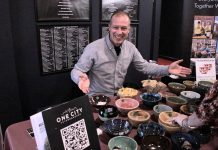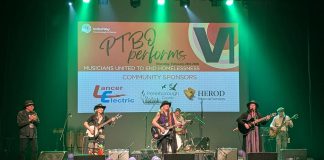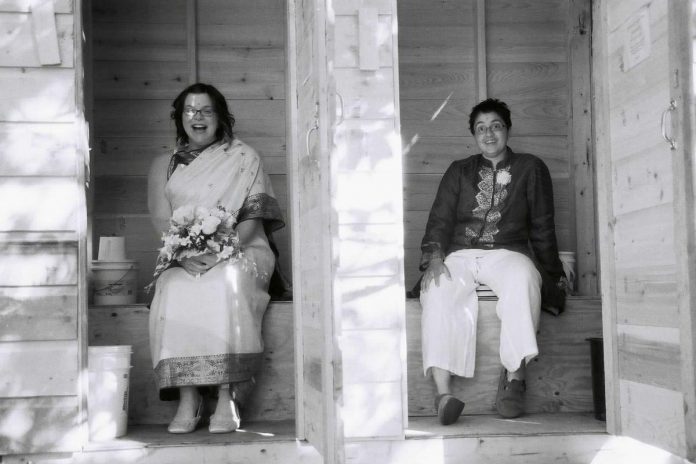
“I think they’re really brave.”
That’s what the 14-year-old son of Sheena Howard, founder of Peterborough’s Acceptance Nurse Psychotherapy, and Dr. Vanita Lokanathan, Peterborough family physician, said when asked what he thinks of having two moms who were among the first same-sex couples to be legally married in Canada.
Almost two decades after their wedding, the couple is sharing why June’s Pride Month celebrations are necessary to ensure others don’t have to be quite so brave.
“For a community that that has been so vilified and so excluded, and has had laws made against them and then laws that haven’t changed, to celebrate yourself and the cultural aspects of our community is so important,” says Howard. “It’s more important to do that now than ever.”
On July 1, 2006 on a Haida Gwaii island in British Columbia, Howard and Lokanathan’s wedding was the not-to-be-missed party of the century for the small community.
We’re talking a potluck with close to 300 people — from as young as a week old to 90 years old — in attendance, community members lending canvas tents and chairs, and guests getting out of speeding tickets because they announced where they were going. The couple even had a scroller on the local news station inviting everybody, including the local MP and tourists who Howard and Lokanathan had never met.
The grand community celebration was fitting because theirs was the first same-sex marriage to happen on the island that would be recognized across Canada. While same-sex marriage had been legalized in British Columbia since 2003, it was not recognized across Canada until July 2025. The couple’s officiant was a “renegade” who had been marrying same-sex couples before it was legal. Howard and Lakanathan was her first official same-sex marriage — and her last, as she passed away just a few weeks later.
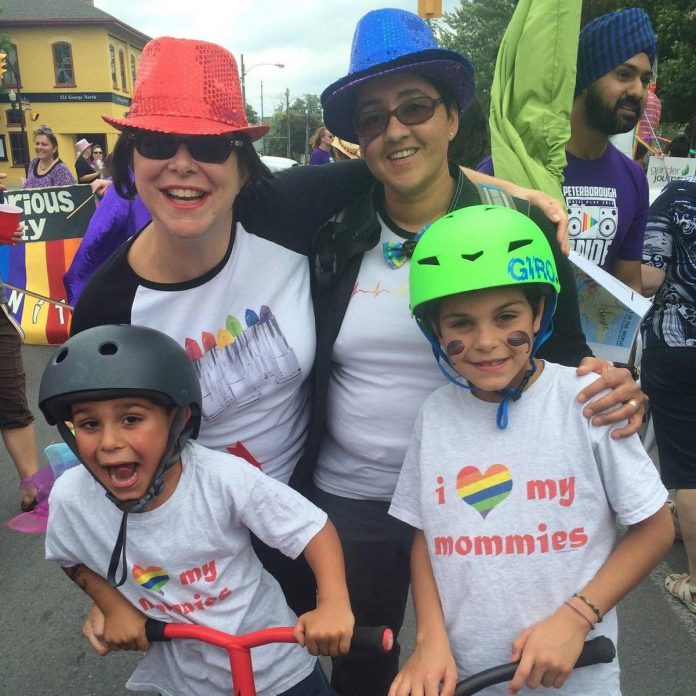
“We did have lots of conversations about even whether or not we should get married — if we were buying into some heterosexual institution and all that — but then, ultimately, we just both really wanted to get married,” says Howard.
“It was really hurtful to think that it wasn’t legal in my country that I lived in and where we served as healthcare providers. It felt so incongruent to the values that Canada was saying and holding themselves up with. It was really important for us to wait until all of that had settled, but once it did, we thought ‘Let’s be a part of this movement. Now it’s time for us to be recognized.'”
Paraphrasing something said to her, Lokanathan adds, “Marriage in a public way was part of saying we’re choosing to make this commitment and as part of our community — whether friends, acquaintances, or family — we are inviting you to be part of the community that supports our marriage.”
The couple explains they were also conscious that, due to their positions and roles within the community, they were privileged in how they were able to be publicly “out” while many colleagues and youth remained closeted.
In fact, being some of the few openly LGBTQ+ people on the island was the cause of their meeting in the first place. After Howard was interviewed for a public health nurse position three years prior, the hiring nurse asked her if she wanted to speak with Lokanathan to hear her experience as a lesbian in the community.
“We talked on the phone, and she talked my ear off for an hour in the longest phone call of my life,” jokes Lokanathan, adding that it wasn’t until about a year later that they began seeing each other.
Because they were “definitely the most ‘out’ people there,” Lokanathan says, they knew that their wedding meant something to others in the community.
“Because of the privilege we had in terms of our positions, it was important for other people who were less privileged and some of the youth who were unable to come out as LGBT, or even some of our colleagues who were closeted,” she says. “But because they saw that we were out and accepted, they felt more free to come out themselves.”
The couple did not accept wedding gifts, but rather asked guests to donate to a bursary fund that would support LGBTQ+ teens heading to post-secondary school. They raised enough to offer the bursary for three years.
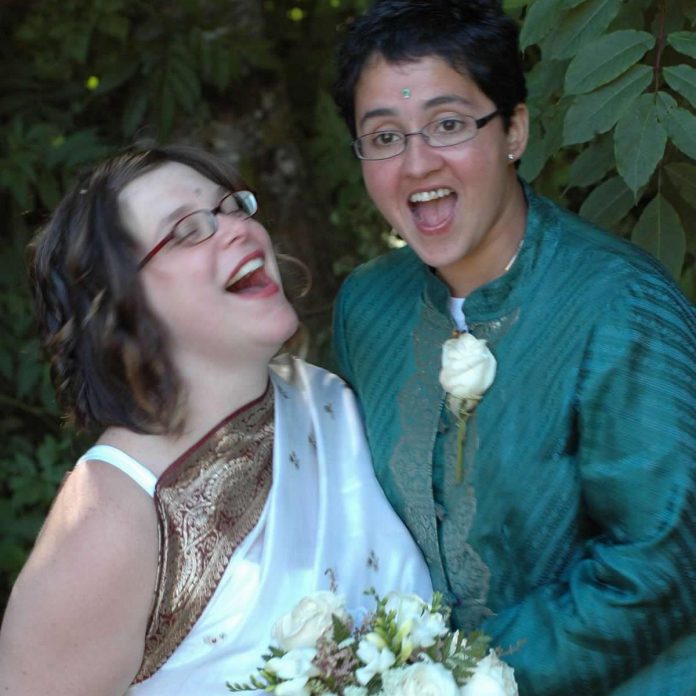
Now living in Peterborough with their two sons, 14-year-old Balan and 18-year-old Ashwyn, Howard and Lokanathan both agree that advertising having a safe and inclusive space is something they prioritize and something they look for in other businesses and organizations.
“When I see the Pride flag flying at my children’s school, I know my family’s welcome,” Howard explains. “And we have had to ask at every school the boys have attended how they’re going to keep our boys safe, and how are they going to be inclusive of their experience.”
“We’ve been met with some really positive language and positive experiences, but having the flag as a representation of support — at least on the surface — that our boys can see is also really important.”
“Sometimes people assume that other people know they’re friendly or safe, which is the wrong assumption,” says Lokanathan. “It doesn’t matter how small it is, but if there’s an inclusive sign or rainbow flag, your shoulders drop because you’re not going in there wondering ‘Is it safe to be me or do (I) have to hide?’ That’s what Pride is. It’s the time where it feels like you can just drop your shoulders and just feel and be able to be fully yourself.”
Born in India before moving to Canada at a young age, Lokanathan says the experience of being of an invisible minority can be different than being a visible one.
“Sometimes it’s that invisible part where people don’t know that about you and then all of a sudden, they have this unanticipated reaction and that’s really hurtful,” she says. “You let your guard down and then you hear something (homophobic) — it’s really hard. So I think visibility in terms of advertising that ‘yes, I’m safe’ is so important for people who are vulnerable.”
To avoid performative allyship (being superficially supportive of a cause but not backing that support with action), Howard and Lokanathan say businesses should be willing to learn and admit when they have made mistakes, such as assuming a person’s sexual orientation.
“Part of putting signage out there is you have to live by that and say, ‘If I mess up, I will own it,'” says Howard. “And my assumption is when institutions fly the flags or have rainbows on their websites or what have you, they’ve done some of the work and they have accountability systems in place.”
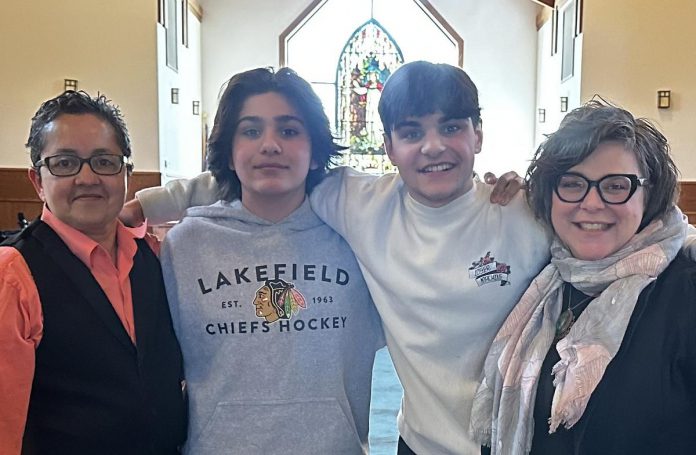
Another message Howard wants to send to allies is to have conversations with their children about different types of families and what it means to show support to a friend.
“I think the next level that needs to happen is not just simply saying ‘Oh, that’s really great your friend’s got two moms’ but asking how are you going to be a good friend to that person,” she says.
“Some of our experiences, unfortunately, have been our boys getting teased, bullied, and (asked) inappropriate questions. Of course, many of their friends backed them up, but some of their friends don’t know how and that’s loud (messaging) for (the boys). That’s really, really loud. And of course, we don’t blame children. This is a conversation that needs to start at home.”
As for celebrating Pride Month through parades and celebrations, Lokanathan says it’s a chance for a minority to experience the privilege of feeling safe.
“People don’t realize the privilege they carry when they’re not part of a visible or invisible minority, and it’s not about us getting extra,” she says, referring to the perception that marginalized groups are getting special recognition that non-marginalized groups don’t get.
“As privileged as we are and out as we are, because Peterborough is relatively small, we still face homophobia and still have to wonder in new spaces if it’s safe or not,” Lokanathan says.
“Until that is no longer the case, that’s why there’s Pride Month and that’s why there’s Black History Month. People who don’t live with those realities really don’t understand that we don’t carry that privilege of safety that (they have). It’s not about asking for more. It’s just a space where you can feel a little bit of a freedom that other people do every other day.”




